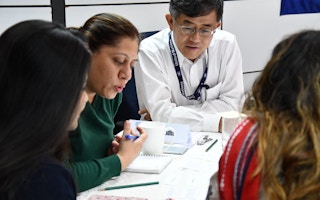Workplace inclusion is key to purposeful businesses, because being excluded destroys culture, as I have previously written.
The Great Recruitment (because we are optimists!) presents opportunities for employers to attract and keep people by being strategically inclusive.
Here’s how:
Begin with recruitment.
To break down unconscious bias — that is, social stereotypes people have that they are unaware of — at the point of hiring, begin with more inclusive language in job descriptions, followed by transparency in interviews, negotiations and fairness with final offers or rejections.
The majority of business leaders across Asia are hugely biased in hiring processes, choosing graduates from the usual-suspect universities, rating higher those with work experience from established organisations and brands.
Perhaps now is the time to consider that experience and education are not the only indicators of the ‘right hire’. Looking for complementary skills sets, desire for learning and overall potential means calling for talent outside of the usual job boards.
Increasingly, CEOs are being hired from different industries, tenured function heads have shifted to innovation roles or start-ups and people with different abilities from the arts to culinary and nutrition have been hired into corporate roles.
The Singapore Business Network on Disability (SBNoD) for example, is a community of businesses who are committed to creating an inclusive workplace for persons with disability (PWD). One of its members, Deutsche Bank, runs a 10-week Work Placement Programme teaching interns with different abilities on how bank operations can be evolved for their needs - which has also resulted in some being hired into full-time roles.
Invest in ‘belonging’ to banish exclusion.
Championing inclusion goes beyond revamping policies and cannot just be about supporting International Women’s Day or having a panel on LGBTQ+ experiences in annual employee conferences. Making unconscious bias training mandatory or ensuring that everyone is part of a diversity, equity and inclusion (DEI) employee resource group are also only starting points, alongside board diversity programmes and better parental leave. As the World Economic Forum’s 2022 gender parity report shows, not enough is being done if it’s going to take 132 years to close the gender parity gap!
Business leaders can start reversing the deeply ingrained practices of exclusion in day-to-day corporate life by introducing new habits.
Singaporean author and inclusion strategist Ruchika Tulshyan argues that inclusion takes awareness, intention, and regular practice. It could start with something as simple as the “no interruption” practice. She says when women speak up in the workplace, they’re often interrupted or considered too aggressive. But, if they stay silent, they’re considered incompetent or lacking in leadership qualities.
As leaders, we can make it a point to support the minorities in our teams and say: “I would really like to hear what they have to say”. By sponsoring this practice, we create space for minorities to be seen and heard and carve their seat at the table.
Foster psychological safety.
Communicating to staff that whoever you are, wherever you come from, you are welcome, and that you are valued, is an empowering message that if converted to everyday encounters can really build employee engagement.
Tech firm Cisco launched an ASEAN workforce reverse mentoring pilot programme where junior staff were paired with managers to allow them to better understand each other’s workload and world view. The idea was to remove hierachical barriers, foster empathy and inclusion and even enable innovation.
The initiative also encouraged “learning safety” where mistakes are not only accepted but are worked through by making giving and receiving feedback a habit. Over time, this builds confidence among staff regardless of age, tenure, or title to offer an opportunity for change or improvement without fear of reproach.
Leaders need vulnerability and greater empathy to start building an inclusive culture.
The work does not stop there though - employees have to go bigger, bolder and braver and push for these changes to take place. Keep the pressure on, report success every step of the way and hold leaders accountable.
Pat Dwyer is the founder and director of The Purpose Business, a sustainability consultancy. She is the former corporate director of CSR and sustainability at Shangri-La Hotels & Resorts.


















